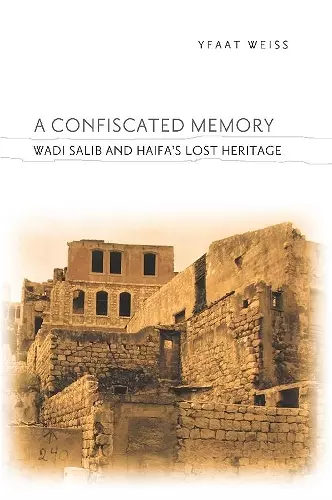A Confiscated Memory
Wadi Salib and Haifa's Lost Heritage
Format:Hardback
Publisher:Columbia University Press
Published:17th Jan '12
Currently unavailable, and unfortunately no date known when it will be back

Yfaat Weiss tells the story of an Arab neighborhood in Haifa that later acquired iconic status in Israeli memory. Weiss investigates the erasure of Wadi Salib's Arab heritage and its emergence as an Israeli site of memory. Through her sensitive reading of events, she offers uncommon perspective on the personal and political making of Israeli belonging.
Yfaat Weiss tells the story of an Arab neighborhood in Haifa that later acquired iconic status in Israeli memory. In the summer of 1959, Jewish immigrants from Morocco rioted against local and national Israeli authorities of European origin. The protests of Wadi Salib generated for the first time a kind of political awareness of an existing ethnic discrimination among Israeli Jews. However, before that, Wadi Salib existed as an impoverished Arab neighborhood. The war of 1948 displaced its residents, even though the presence of the absentees and the Arab name still linger. Weiss investigates the erasure of Wadi Salib's Arab heritage and its emergence as an Israeli site of memory. At the core of her quest lies the concept of property, as she merges the constraints of former Arab ownership with requirements and restrictions pertaining to urban development and the emergence of its entangled memory. Establishing an association between Wadi Salib's Arab refugees and subsequent Moroccan evacuees, Weiss allegorizes the Israeli amnesia about both eventual stories--that of the former Arab inhabitants and that of the riots of 1959, occurring at different times but in one place. Describing each in detail, Weiss uncovers a complex, multilayered, and hidden history. Through her sensitive reading of events, she offers uncommon perspective on the personal and political making of Israeli belonging.
This beautifully written book tells the story of refugees and immigrants who lived during the twentieth century in a single neighborhood in Haifa (Wadi Salib), enduring victimization as a result of war and long ethnic, national, and social discrimination and transformation. Yfaat Weiss focuses on a pre-1948 Palestinian neighborhood in a predominantly Jewish City, laying out the way the displacement of Palestinians gave way to Jewish migrants, who were themselves refugees enduring social discrimination in Israel and were evicted as a result of Israel's most famous social upheaval (1959), a watershed moment in Israeli ethnic relations between Ashkenazy and Sephardic Jews. This captivating history of a mosaic of exclusion and inclusion of national and immigrant minorities-in addition to its other merits, it is an outstanding urban study--reveals the parallel and separate experiences of repeated displacement. This community of 'diachronic neighbors' illuminates the memory of a place and a sequence of displacements. Weiss brings to life and revives the memory of disappeared cultures displaced by war and the drive to modernization. -- Elazar Barkan, professor of international and public affairs and director of the Institute for the Study of Human Rights, Columbia University, and coauthor of No Return, No Refuge: Rites and Rights in Minority Repatriation [T]his study adds to the broader discourse on identity and conflict in Israel. Choice [An] important contribution to the growing literature on collective memory and forgetting. -- Michael Feige, Ben-Gurion University American Historical Review
ISBN: 9780231152266
Dimensions: unknown
Weight: unknown
272 pages